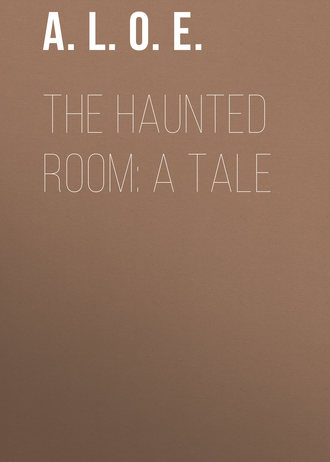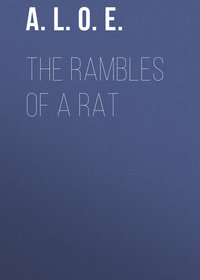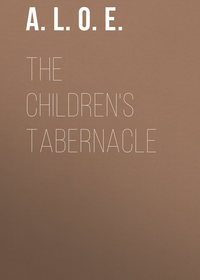 полная версия
полная версияThe Haunted Room: A Tale
“You speak of our hearts?” asked Emmie.
“I do,” replied her uncle. “It is my belief that not one person in ten thousand knows the ins and outs, the dark corners, the hidden chambers, of that which he bears in his own bosom.”
“Every Christian must,” said Bruce; “for every Christian is bound to practise the duty of self-examination.”
“I hope that you don’t call every one who does not practise it a heathen or a Turk,” cried Vibert. “All that dreadful hunting up of petty peccadilloes, and confessing a string of them at once, is, at least to my notion, only fit work for hermits and monks!”
“We are not talking about confession, but simply about self-knowledge,” observed the captain.
“Oh, where ignorance is bliss,” began Vibert gaily; but his brother cut short the misapplied quotation with the remark, “Ignorance of ourselves must be folly.”
Vibert took up again the comic paper which he had laid down, and pretended to re-examine the pictures. But for the captain’s presence the youth would have begun to whistle, to show how little he cared for Bruce’s implied rebuke; for, as Vibert had often told Emmie, he had no notion of being “put down” by his brother.
“Do you think it easy to acquire self-knowledge?” asked Arrows, fixing his penetrating glance upon Bruce, who met it with the calm steadiness which was characteristic of the young man.
“Like any other kind of knowledge, it requires some study,” replied Bruce Trevor; “but it is not more difficult to acquire than those other kinds of knowledge would be.”
“In that you come to a different conclusion from that of the writer of this book,” observed Arrows; and he read aloud the following lines from Dr. Goulburn’s “Thoughts on Personal Religion,” the volume which he held in his hand: —
“‘One of the first properties of the bosom sin with which it behoves us to be well acquainted, as our first step in the management of our spiritual warfare, is its property of concealing itself. In consequence of this property, it often happens that a man, when touched in his weak point, answers that whatever other faults he may have, this fault, at least, is no part of his character.’”
The captain read the quotation so emphatically that Vibert again threw down his paper, and listened whilst Arrows thus went on: —
“‘This circumstance, then, may furnish us with a clue to the discovery: of whatever fault you feel that, if accused of it, you would be stung and nettled by the apparent injustice of the charge, suspect yourself of that fault, in that quarter very probably lies the black spot of the bosom sin. If the skin is in any part sensitive to pressure, there is probably mischief below the surface.’”
“I doubt that the author is right,” observed Bruce. “Besetting sins cannot hide themselves thus from those who honestly search their own hearts.”
“Perhaps some search all but the haunted chamber,” suggested Vibert. Captain Arrows smiled assent to the observation.
“By way of throwing light on the question,” said he, “suppose that each of you were to set down in writing what you suppose to be your besetting sin; and that I – who have watched your characters from your childhood – should also put down on paper what I believe to be the bosom temptation of each. Is it likely that your papers and mine would agree; that the same ‘black spot’ would be touched by your hands and mine; that we should point out the same identical fault as the one which most easily and frequently besets the soul of each of you three?”
“It would be curious to compare the two papers,” cried Vibert. “I wish, captain, that you really would write down what you think of us all. It would be like consulting a phrenological professor, without the need of having a stranger’s fingers reading off our characters from the bumps on our heads.”
“I am not speaking of the whole character, but of the one sin that most easily besets,” said the captain. “Would a close observer’s view of its nature agree with that held by the person within whose heart it might lurk?”
“Perhaps not,” said Bruce, after a pause for reflection. “But the person beset by the sin would know more about its existence than the most acute observer, who could judge but by outward signs.”
“That is the very point on which we differ,” remarked Captain Arrows. “The property of the bosom sin is to conceal itself, but only from him to whom the knowledge of its presence would be of the highest importance. I should be half afraid,” the captain added with a smile, “to tell even my nephews and niece what I thought the besetting sin of each, lest they should be ‘stung and nettled by the apparent injustice of the charge,’ and feel, though they might not say it aloud, that ‘whatever other faults they may have, this fault, at least, forms no part of the character in question.’”
The captain’s hearers looked surprised at his words. Vibert burst out laughing. “You must think us a desperately bad lot!” cried he.
“Uncle, I wish that you would write down what you think is the besetting sin of each of us,” said Emmie, “and give the little paper quietly to the person whom it concerns, not, of course, to be read by any one else. I am sure that I would not be offended by anything you would write, and it might do me good to know what you believe to be my greatest temptation.”
“As you are going away to-morrow, you would escape the rage and fury of the indignant Emmie, however ‘stung and nettled’ she might be!” laughed Vibert Trevor. “Now, Bruce,” added the youth sarcastically, “would you not like the captain to inform you confidentially what he considers the tiny ‘black spot’ in your almost perfect character?”
“I have no objection to my uncle’s writing down what he chooses,” replied Bruce coldly. “All that I keep to is this, – neither he nor any other man living can tell me a fact regarding my own character which I have not known perfectly well before.”
“Were I to agree to write down my impressions, it would be to induce you all to give the subject serious reflection,” observed the captain. “It matters little whether I am or am not correct in my conclusions; but it is of great importance that no one should be deceived regarding himself. I wish to lead you to think.”
“Oh, I’ll not engage to do that! I hate thinking; it’s a bore!” cried Vibert gaily. “I know I’m a thoughtless dog, – ah, I’ve hit the ‘black spot’ quite unawares! Thoughtlessness is my besetting sin!”
“My difficulty would be to single out one amongst my many faults,” said Emmie.
“Now that is humbug; you know that it is!” exclaimed her youngest brother. “You have no fault at all, except the fault of being a great deal too good. I should like you better if you were as lively and larky as Alice!”
“Saucy boy!” said Emmie, and she smiled.
“But, captain,” continued Vibert, addressing himself to his uncle, “though we are willing enough to read what you write, we won’t be driven to anything in the shape of confession. You may tell us what is your notion of what lurks in our haunted rooms, but we won’t invite you in and say, ‘Behold there’s my besetting sin!’”
“I want no confessions,” said Captain Arrows. “I repeat that my only object is to induce you to pull down your brickwork, draw back your curtains, and search for yourselves; or, to drop metaphor and speak in plain words, to lead you to make the discovery of the weakest point in your respective characters the subject of candid investigation and serious thought.”
And to a certain degree this desired result was obtained. Though Vibert laughed, and Bruce looked indifferent, to their minds, as well as to that of their sister, the subject of self-knowledge recurred at different parts of the evening.
“I don’t suppose that the captain can look further through a mill-stone than can any one else,” thought Vibert; “yet he has uncommonly sharp eyes, and is always on the watch. No doubt he learned that habit at sea. I am glad that he can detect some fault in Master Bruce, who is a kind of pope in our house, though I, for one, don’t believe in his infallibility. I wonder on what my uncle will fix as the bad spirit in my haunted room. I should say – let me think – I have never thought about the matter before. Well, I don’t take to religion as earnestly as do papa and my elder brother and sister. I don’t go twice to church on Sundays, nor – if the truth must be owned – do I pay much attention to the service whilst I am there. I’d rather any day read a novel than a serious book. I believe that’s the worst I can say of myself. The captain would call that – let me see – would he call that irreligion? No, no; that name is too hard. I’m thoughtless, I own, but certainly not irreligious. Impiety? Why, that is worse still! I do not pretend to be in the least pious, but still I’d be ready to knock down any fellow who called me the reverse. I’m something between the two poles. Levity? Ah, that’s the word, the precise word to describe my besetting sin, if one can call mere levity a sin. I am no man’s enemy but my own; and not my own enemy either, for I spare and indulge myself in every way that I can. Levity may be a fault at sixty, but it’s no fault at all at sixteen. I should decidedly object to be as sober as Bruce. He goes on his way like a steady old coach, while I am like a bicycle,” – Vibert laughed to himself as the simile occurred to his fancy. “A bicycle is quick, light, not made to carry much luggage, and a little given to coming to smash! Yes, I skim the world like a bicycle, and levity is my worst fault!” Yawning after the unusual effort of even such cursory self-examination, Vibert now set his thoughts free to ramble in any direction, satisfied that nothing of a serious nature could be laid to his charge.
“It is strange that my uncle should imagine that he can penetrate the recesses of the heart of another,” such was the reflection of Bruce, as, candle in hand, he mounted the staircase that night. “Captain Arrows can but judge of my character by my outward conduct, and he can have seen but little to find fault with in that. I own – and with regret – that in many points I fail in my duty towards my Maker; but that is a secret between my conscience and God, – a secret which no man can penetrate, and with which no man has a right to meddle. Yet it is evident that my uncle has detected some visible error, whatever that error may be. I am aware that I have a defective temper, but I have lately been gaining some control over that which Calvin called an ‘unruly beast.’ I may, indeed, have betrayed some impatience in my manner towards Vibert in the presence of my critical uncle,” thus flowed on the reflections of Bruce as he entered his room, and closed the door behind him. “I now remember my uncle’s remarking to me that I might have more influence with my brother if I showed him greater indulgence. But who can have patience with Vibert’s follies?” Bruce set down his candle, and threw himself on a chair. “Vibert has been a spoilt child from his cradle, and now, when nearly seventeen years of age, is no better than a spoilt child still! Our poor dear mother made her youngest-born almost an idol; my father is blind to his faults; Emmie pets and humours him to the top of his bent; and all the world does the same. Vibert is admired, courted, and welcomed wherever he goes, because, forsooth, his face is what girls call handsome, and he can rattle off any amount of nonsense to please them. Vibert does not mind playing the fool, and he plays it to the life!” Bruce paused, and conscience gave a low note of warning to the elder brother. “I am, I fear, harsh in my judgment. Want of charity, that is perhaps my besetting sin. I am too quick to perceive the faults and follies of others. That is a quality, however, which is not without its advantages in a world such as this. I am not easily taken in; mere veneer and gilding will not deceive my eye. I cannot be blind, if I wish it, either to my own faults or to those of others.” Bruce thought that he knew himself thoroughly, and that there was no haunted room in his heart which he had not boldly explored.
Emmie Trevor had her heart-searchings as she sat silent before her mirror, while Susan brushed out the long glossy tresses of her young mistress’s hair.
“I would fain know what my dear uncle regards as my besetting sin,” mused the gentle girl. “I was so foolish as almost to fancy that one so loving and partial as he is would not notice my faults, and I am still more foolish in feeling a little mortified on finding that I was mistaken in this. What defect in my character is most likely to have struck so acute an observer? My uncle cannot possibly know how often my thoughts wander in prayer; how cold and ungrateful I sometimes am even towards Him whom I yet truly love and adore. It is something in my outward behaviour that must have displeased my uncle. Is it vanity?” Emmie raised her eyes to her mirror, and had certainly no reason to be dissatisfied with the face which she saw reflected in the glass. “Yes, I fear that I am vain; I do think myself pretty, and I cannot help knowing that I sing well, – I have been told that so often. Then I have certainly love of approbation; my uncle may have detected that, for it is so sweet to me to be admired and praised by those whom I love, – and perhaps by others also. This vanity and love of approbation may lead to jealousy, a very decided sin. Did I not feel some slight vexation even at Vibert’s playful words about Alice, his wish that I were more like that gay, giddy girl? I find Alice nice enough as a companion, but would certainly never set her up as a model. I am afraid,” – thus Emmie pursued the current of her reflections, – “I am afraid that I might be haunted by jealousy, if circumstances gave me any excuse for harbouring a passion so mean, so sinful. I have often thought that for papa to marry again would be to me such a trial. I could hardly bear that any one, even a wife, should be dearer to him than myself. I should grieve at his doing what might really add to his comfort; and oh! is not this selfish, hatefully selfish? It shows that with all my love for my only remaining parent, I care for his happiness less than my own. Certainly selfishness is in my character; it lurks in my haunted chamber, and doubtless my uncle has found it out! Then am I not conscious of giving way to indolence, and harbouring self-will? There are duties which I know to be duties, and yet from the performance of which I am always shrinking, making excuses for my neglect such as conscience tells me are weak and false. Truly mine is a very faulty character, yet am I given to self-deception; the kindness and partiality of every one round me help to blind me to my own faults, and perhaps to draw me into a little hypocrisy, to make each ‘black spot’ more black.”
It will be observed that Emmie was no stranger to self-examination; it was to the maiden no new thing to commune with her heart and be still.
CHAPTER VI.
THREE WARNINGS
“You are right, Bruce; it is certainly desirable for you to go down to Wiltshire to-day to make any needful arrangements, and prepare for our arrival to-morrow,” said Mr. Trevor to his son on the following morning, when the family were at the breakfast-table. “New servants will need verbal directions; and you will see to the unpacking of the furniture which I have sent down from this place, and to the most suitable disposal of it in the several rooms of Myst Court.” The gentleman rolled up his breakfast-napkin, and slipped it into its ring. “Your train starts at 10.30,” he added, as he rose from his seat.
“Is Vibert to go with me?” inquired Bruce, glancing at his brother, who had, as usual, come down late, and was still engaged with his anchovies and muffin.
“I do not think that Vibert would give you much help,” observed Mr. Trevor.
“No help at all,” exclaimed Vibert quickly. “It may be just in Bruce’s line to order and direct, see that there are enough of pots and pans in the kitchen, meat in the larder, and fires all over the house; but as for me – ”
“You think it enough to eat the food and enjoy the fire,” observed the captain drily.
“And I positively must go to Albert Hall to-night; the Nairns have asked me to make one of their party, and I really could not disappoint them,” continued Vibert. “It is quite necessary that I should have a little amusement before going to bury myself in the wilds of Wiltshire. As Moore the poet sings, —
‘To-night at least, to-night be gay,
Whate’er to-morrow brings!’”
“That’s fair enough,” observed the indulgent father.
Bruce exchanged a glance with his uncle which conveyed the unuttered thought of both: “It is scarcely fair that one brother should have all the trouble and the other all the amusement.” Vibert noticed the look, and laughed.
“Duty first – pleasure afterwards – that’s the motto taught to all good little children!” he cried. “Bruce, you are the elder, and like to be first, so you naturally pair off with duty, whilst I am modest enough to be quite contented with pleasure.”
Mr. Trevor smiled at the jest, though he shook his bald head in gentle reproof. Then turning to his brother-in-law, he observed, “Edward, I have an early engagement in London, and must be off to the station. I am afraid that I shall not find you here on my return.”
“I also start early,” said the captain. “Emmie has ordered the conveyance to be at the door at ten. I must therefore wish you good-bye now, thanking you for my pleasant visit to Summer Villa, and hoping next spring to find you all well and happy in your new home.”
The brothers-in-law cordially shook hands and parted, Mr. Trevor going off to the station, as usual, on foot.
“I say, Bruce,” observed Vibert, “if you have the settling about the rooms at Myst Court, mind that you give me a good one. I like plenty of air and light, and a cheerful view. No poky little cabin for me, nor an attic at the top of the house; long stairs are a terrible bore.”
“I shall certainly give my first attention to the accommodation of my father and sister,” said Bruce; “they never think of themselves.”
“A hit at me, I suppose,” cried Vibert with unruffled good-humour. “Ah! that reminds me of our conversation last evening. Captain, have you been hunting up the ghosts in our haunted rooms?” asked the youth as he rose from his place at the breakfast-table.
Arrows replied by drawing forth a memorandum-book from the pocket of his surtout. He unclasped it, and took out from it three minute pieces of paper, neatly folded up and addressed.
“I am going upstairs to look after my luggage,” said the captain; “I leave with you – ”
“These three private and confidential communications!” cried Vibert, playfully snatching the papers out of his uncle’s hand. “Each one, I see, is directed: here’s yours, Emmie; yours, Bruce; and here is mine!”
Captain Arrows did not wait to watch the effect produced by his little missives, but quitted the room to complete preparations for his departure.
“I’m of a frank nature,” said Vibert; “I don’t care if all the world hear my good uncle’s opinion of me!” and, unfolding the scrap of paper which he held, the youth read aloud as follows: “Be on your guard against the Pride that repels advice, resents reproof, and refuses to own a fault. I don’t recognize my likeness in this photo!” cried the youth; “if the portrait had been intended for Bruce,” – Vibert turned the paper and looked at the back – “sure enough, it is directed to Bruce; and the captain has hit him off to the life!”
“You made the apparent blunder on purpose,” said Bruce with ill-suppressed anger, as he took the paper from Vibert, and then threw it into the fire. Then, after tossing down on the table the unopened note which had been handed to him first, Bruce Trevor turned on his heel, and quitted the apartment.
“Stung and nettled! stung and nettled! does he not wince!” cried Vibert, looking after his brother. “The captain has, sure enough, laid his finger on the sensitive spot!”
“I am so much vexed at your having read that private paper aloud,” said Emmie; “it was never intended that we should know its contents.”
“It told us nothing new,” observed Vibert. “Bruce’s pride is as plain as the nose on his face; only, like the nose, it is too close to him – too much a part of himself, for him to see it.”
“Bruce is a noble, unselfish, generous fellow!” cried Emmie.
Vibert cared little to hear his brother’s praises. “What is in your tiny paper?” he asked, after he had glanced at his own. “Why, Emmie, you look surprised at what our uncle has written. Tell me, just tell me what lurking mischief the sharp-eyed Mentor has ferreted out in you. Some concealed inclination to commit burglary or manslaughter?”
“I do not quite understand what my uncle means,” said Emmie, gazing thoughtfully upon the little missive which she had opened and read.
“I could explain it – I could make it clear – just let me see what the oracle has written!” cried Vibert, with mirth and curiosity sparkling in his handsome dark eyes. “I’ll tell you in return, Emmie, what he has put in my scrap of paper: Beware of Selfishness. Short but not sweet, and rather unjust. I am thoughtless and gay, I care not who says that much; but as for being selfish, it’s a slander, an ungenerous slander!”
“Perhaps our uncle has again laid his finger on a sensitive spot,” observed Emmie with a smile, but one so gentle that it could not offend.
“I want to know what the fault-finder lays to your charge, what solemn admonition has called up the roses on those fair cheeks!” cried the younger brother; and throwing one arm round Emmie, with his other hand Vibert possessed himself of the paper of the scarcely resisting girl, sharing her surprise as he glanced at the two words written upon it. Those words were —Conquer Mistrust.
“Mistrust of what or of whom?” said Vibert. “The oracle has propounded a kind of enigma: as you are going to take a tête-à-tête drive with the captain, you will have an opportunity of getting an explanation of your paper. As for mine, it goes after Bruce’s – into the fire.” Vibert suited the action to the word.
About half-an-hour afterwards the conveyance which was to take Captain Arrows from Summer Villa was driven up to the door. Emmie was ready, as arranged, to accompany her uncle part of the way. John handed up his luggage to be disposed of on the coach-box. Vibert came to the door to see the guest depart and bid him farewell. “I’ll show him,” said the youth to himself, “that I bear him no grudge for a warning that was not very necessary, and certainly not very polite.”
“Good-bye, captain,” cried Vibert, as he shook hands with his uncle; “come to Myst Court next spring, and you and I will make a raid on the haunted chamber.”
“Where is Bruce? I have not wished him good-bye,” said the captain, pausing when he was about to hand his niece into the carriage.
“Bruce!” called the clear voice of Emmie, as she ran back to the bottom of the staircase to let her brother know that the guest was on the point of departing.
“Bruce!” shouted Vibert with the full strength of his lungs.
There was no reply to either summons, and Emmie suggested that her brother might have gone out, not remembering that the carriage had been ordered so early. After a few minutes’ delay, Arrows handed her into the carriage, with the words, “You will bid Bruce good-bye for me.”
“None so deaf as those who won’t hear,” muttered Vibert, when the vehicle had rolled from the door. “Bruce heard us call, but he is in a huff, and did not choose to appear. He repels advice, resents reproof, and yet won’t believe that he’s proud! No more, perhaps, than I believe that I’m selfish!”
CHAPTER VII.
MISTRUST
“I am so glad to have a little time for quiet conversation with you, dear uncle,” said Emmie, as the carriage in which she was seated beside Arrows proceeded along the drive. “I want to ask you,” – she hesitated, and her voice betrayed a little nervousness as she went on, – “what it was that you meant when you bade me conquer Mistrust?”
“Let me refer you to our old favourite, the Pilgrim’s Progress,” replied the captain. “In whose company did the dreamer represent Mistrust, when he ran down the Hill of Difficulty to startle Christian with tidings of lions in the way?”
“In the company of Timorous,” said Emmie.
“And have you no acquaintance with that personage?” asked the captain.







